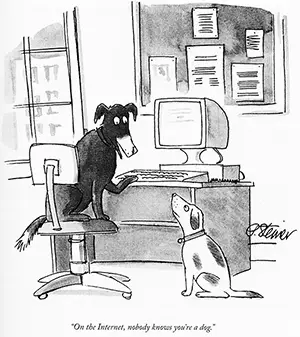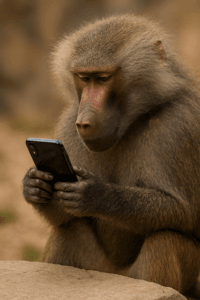Thirty years ago, a cartoon appeared in the New Yorker that would become one of the defining images of the early internet era. Drawn by artist Peter Steiner, it showed a dog sat at a computer keyboard, turning to another dog and saying, “On the internet, nobody knows you’re a dog.”
Like all great cartoons, this one brilliantly captured the zeitgeist of the time. By 1993, the excitement of the early internet pioneers was being tempered by mounting concerns that online, things were not always what (and who) they seemed. As well as providing a platform for business and entertainment, the World Wide Web, as it was then known, was revealing a darker side of false personas and fake IDs.
Which is why Steiner’s dog cartoon was so timely.
Three decades on, and with the dawn of Artificial Intelligence, internet-browsing dogs feels like the least of our concerns.
As the development of AI accelerates, the challenge will be to work out not only if the person you’re emailing isn’t who they say they are, but whether “they” actually exist.
Already, sophisticated chatbots drawing on fast-learning generative AI platforms are processing millions of customer queries, anticipating needs and making complex decisions about personal credit ratings and risk.
No sector is untouched. AI is producing chart-topping singles, winning prestigious photography competitions, passing law and medical exams, composing romantic poetry, starring in movies, writing lesson plans, designing apps – it’s even modelling clothes. Until it’s been pointed out to them, almost no one has been able to spot the difference. No wonder philosophers such as Israeli academic Noah Yuval Harari have compared the dawn of AI it to the arrival of an alien species.
The impact of AI on jobs, particularly those in ‘white-collar’ sectors, is likely to be just as seismic.
BT has recently announced that it intends to shed 55,000 roles, with up to a fifth of these being replaced by AI. This is likely to be only the tip of a continental-sized A-I-ceberg. According to analysts, up to 300 million jobs are set to be be replaced by AI over the next few years. Another study puts it as high as 80 per cent of all “human” jobs.
This reference to “human” jobs has got me thinking. Could it be that jobs for other species will be left untouched by AI?
Perhaps being a dog on the internet is not such a bad idea after all.







